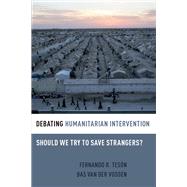
Debating Humanitarian Intervention Should We Try to Save Strangers?
by Tesón, Fernando R.; van der Vossen, Bas-

This Item Qualifies for Free Shipping!*
*Excludes marketplace orders.
Buy New
Rent Textbook
Rent Digital
Used Textbook
We're Sorry
Sold Out
How Marketplace Works:
- This item is offered by an independent seller and not shipped from our warehouse
- Item details like edition and cover design may differ from our description; see seller's comments before ordering.
- Sellers much confirm and ship within two business days; otherwise, the order will be cancelled and refunded.
- Marketplace purchases cannot be returned to eCampus.com. Contact the seller directly for inquiries; if no response within two days, contact customer service.
- Additional shipping costs apply to Marketplace purchases. Review shipping costs at checkout.
Summary
Philosophers Fernando Tesón and Bas van der Vossen offer contrasting views of humanitarian intervention, defining it as either war aimed at ending tyranny, or as violence. The authors employ the tools of impartial modern analytic philosophy, particularly just war theory, to substantiate their claims. According to Tesón, a humanitarian intervention has the same just cause as a justified revolution: ending tyranny. He analyzes the different kinds of just cause and whether or not an intervener may pursue other justified causes. For Tesón, the permissibility of humanitarian intervention is almost exclusively determined by the rules of proportionality. Bas van der Vossen, by contrast, holds that military intervention is morally impermissible in almost all cases. Justified interventions, Van der Vossen argues, must have high ex ante chance of success. Analyzing the history and prospects of intervention shows that they almost never do.
Tesón and van der Vossen refer to concrete cases, and weigh the consequences of continued or future intervention in Syria, Somalia, Rwanda, Bosnia, Iraq, Lybia and Egypt. By placing two philosophers in dialogue, Debating Humanitarian Intervention is not constrained by a single, unifying solution to the exclusion of all others. Rather, it considers many conceivable actions as judged by analytic philosophy, leaving the reader equipped to make her own, informed judgments.
Author Biography
Fernando R. Tesón is the Tobias Simon Eminent Scholar at Florida State University College of Law. He is the author, inter alia, of Justice at a Distance: Extending Freedom Globally (Cambridge University Press, 2015) [with Loren Lomasky] and Humanitarian Intervention: An Inquiry into Law and Morality , 3rd ed. (Transnational Publishers 2005), and dozens of articles in specialized journals.
Bas van der Vossen is an Associate Professor of Philosophy at the University of North Carolina Greensboro. He specializes in political philosophy. Previously, his work has appeared in The Journal of Political Philosophy, Law and Philosophy, the Oxford Journal of Legal Studies, among other places. He is currently also an associate editor of the journal Social Philosophy and Policy.
Table of Contents
Introduction
Fernando Tesón and Bas van der Vossen
Part I: A defense of humanitarian intervention Fernando Tesón
1. Humanitarian intervention as defense of persons
2. Just cause in humanitarian intervention
3. Intervention and revolution: the equivalence thesis
4. Proportionality in humanitarian intervention
5. Further issues in humanitarian intervention
APPENDIX: The Iraq war
Part II: Humanitarian non-intervention Bas van der Vossen
6. A presumption against intervention
7. Between internal and external threats
8. Why sovereignty (still) matters
9. The success condition
10. Justice ex post or ex ante?
11. Three structural problems
12. Looking for exceptions
13. Humanitarian non-intervention
An electronic version of this book is available through VitalSource.
This book is viewable on PC, Mac, iPhone, iPad, iPod Touch, and most smartphones.
By purchasing, you will be able to view this book online, as well as download it, for the chosen number of days.
Digital License
You are licensing a digital product for a set duration. Durations are set forth in the product description, with "Lifetime" typically meaning five (5) years of online access and permanent download to a supported device. All licenses are non-transferable.
More details can be found here.
A downloadable version of this book is available through the eCampus Reader or compatible Adobe readers.
Applications are available on iOS, Android, PC, Mac, and Windows Mobile platforms.
Please view the compatibility matrix prior to purchase.
